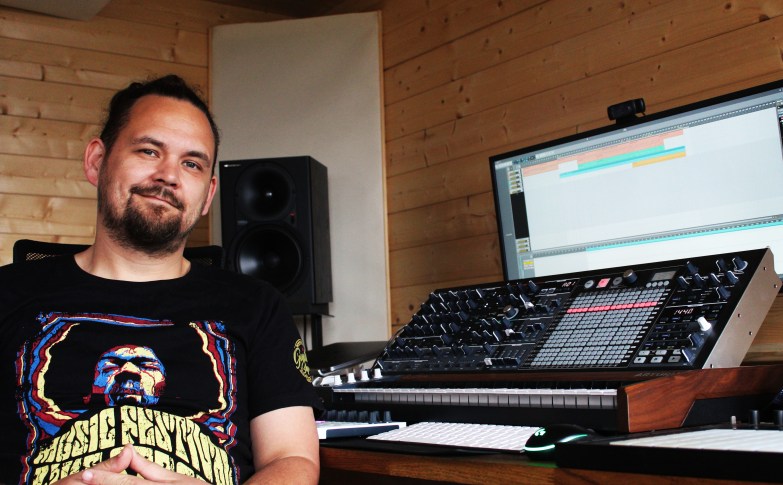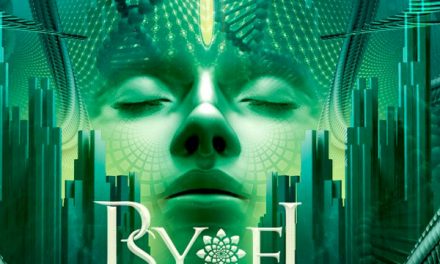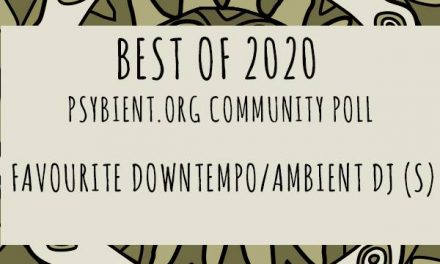Today we are chatting with Steve aka Hedflux! Topics: sonic philosophy, influences, ‘genres’ and music production.
Interview made by Sanjay Gopalkrishnan (FB, IG)
The Album Title: What does it imply?
I’ve been studying Alchemy for many years now, and the concept of the Philosopher’s Stone is of central significance. Huge tomes have been written about it going back over 1000 years, it’s not just a Harry Potter thing.
In 2016 I started something called Audio Alchemy, to explore the relationships between modern music production and ancient alchemical science, and the title of this album reflects that merging of music and alchemy.
Philosopher’s Tone is homophonous with Philosopher’s Stone.
The symbol on the cover is a personalised adaptation of the ancient symbol for the Philosopher’s Stone. It appears just as some basic shapes, but it represents a huge body of knowledge about the nature of reality.
It’s well worth looking into.
For the more curious, it can lead them on a richly rewarding path of knowledge.
What do the track names mean and how do they correspond to the 7 stages of transformation?
Alchemists view all things as transformations of The One Thing.
There are 7 processes by which transformations occur, which are detailed at great length in alchemy books and videos, and in the courses I’ve given before.
These 7 processes correspond with the so-called Septenary, which is the division of 7 which occurs in phenomena throughout nature, such as the 7 colours of the rainbow, 7 notes in the music scale, 7 luminaries, 7 chakras etc etc.
There are also 7 operations involved in the creation of the Philosopher’s Stone, and through studying this I developed a corresponding 7 step process for making music.
Over the years I have produced many tables of correspondences which relate different aspects of reality to music, and for this album I set out to make 7 tracks which are a personal expression of my learning on this subject.
The 7 steps in making The Philosopher’s “Tone”
I’m also a Doctor of Philosophy (PhD) who makes music (tones) so that kinda fits neatly as well.
I can’t explain all the track names here, that’s really for the more curious listener to investigate.
Alchemy and Music: Your sonic philosophy
Music production is a modern alchemical practice. It uses waveforms and samples instead of chemicals and metals. Plugins and racks instead of alembics and laboratory apparatus. It uses electricity instead of fire.
Turning a bunch of raw electrical waveforms and noise into a timeless piece of music is a transformative process, both for the sound itself, and for the artist. It can also be transformative for the listener if they give it the proper attention.
Music also corresponds to architecture. It has been said that “architecture is frozen music” – I would flip it around and say that music is spiritual architecture.
I realized many years ago that the true purpose of art is not to entertain, but to encode knowledge in a format that will endure through the generations.
Architecture, songs and stories are the primary vehicles of truth. The official records and history books are propaganda, they rewrite them every time power changes hands.
The real truth is in the art, but you have to understand the symbolism to decode it, otherwise it just appears as entertainment or creative indulgence.
Basslines : Your basslines are non-aggressive and semi-organic.How do you go about writing the bass parts for your tracks? Are you influenced by bass playing from other genres like jazz or funk?
In this album I made all the basses starting with sine waves, and quite simple melodic patterns. Then using subtle FM, distortion and fx mapped out to controllers I will program the dynamic movement of the bass as a performance, playing with my controllers, capturing all the imperfections and weird little accidents. Then I go in and edit it all until i’m satisfied that it doesn’t get annoying after repeated listens.
I don’t listen to Jazz or Funk really, but I like a wee bit of funkiness or jazziness here and there :)
On the bass/drop question: How do you approach bass drops specifically?
The term ‘drop’ has come to be associated with heavy more aggressive music with huge build ups and explosive drops with lots of noise and intensity, but I always just thought of drops more plainly as ‘the moment when the bass drops’
It’s when the bass comes in after a short break. There are “dry drops” and “wet drops”, the latter having more splashiness and flashiness, crash cymbals, screaming leads or whatever, whereas dry drops are more restrained; just the dry rhythm and bass but perhaps with some subtle variation to lift the energy.
I try to use both in equal measure :)
Your drums are well balanced, fluid, not over punchy (A jazzy sensibility in Unillusioned). Is it to do with the right amount of compression? How much of compression do you use?
I don’t use compressors much to be honest, just a little bit here and there. I don’t think they are some secret sauce to making great music, I just use them to tame peaks occasionally. I use limiters more often.
It’s all in the mix.
With this album I tried to make the mixes good enough so that mastering wasn’t really required. The only mastering (if you can call it that) is some light limiting.
Also, I mastered these more dynamic and with a lower ceiling than my older music, to avoid inter-sample peaking.
It may initially sound a little quieter next to my older music, but you can crank it and get a really smooth dynamic sound at loud volume, and there will be no distortion even on the cheapest of systems.

What is your approach to sound synthesis and sound selection : melodies, glitches, grains, bleeps, atmospheres Are they synthesised in the box?
For this album, I approached things a bit differently. In order to get as pure a sound as possible, I used just sine wave oscillators with white noise and drum samples.
The exceptions are tracks 5 and 7, which have some keys and vocals in them, but the other tracks were all made with sine waves and noise. All of it was made digitally, in the box.
In approaching sound design, I like to create many dimensions of control, and explore the entire space of the sound using modulation. I use random generators often to keep things interesting, more natural sounding, and help me avoid fatigue of hearing the same loops repeating over and over.
I would love to know what is your take on musical ‘genres’ as a whole.
Genres are often geographical, like accents, they are the sound of a particular region or country. Different territories resonate to different tempos.
Genre’s also reflect a particular type of lifestyle, attitude or subculture.
If you look at all the different types of people in a typical city, from the high flying office workers to the kids in the slums to the wealthy elite, they all resonate with different genres of music based on their place within the city structure.
Genres connect people of like mind, and they are useful for musical classification, and learning how to produce. It’s a great feeling dancing together with people who all love the same genre of music. Bliss!
I always found myself in this between-genre space, because I really liked this simple kick-snare 8th note rhythm, I always loved it – the one from Billie Jean – it’s the most common beat in my music.
However, the use of a snare drum prohibits one from joining the house, techno or trance club.
And if you sound at all like psytrance, then you’re prohibited from joining the breaks club.
It’s quite funny, the separation between breakbeats and 4-to-the-floor beats is actually a cultural divide going back to the origins of hip-hop and disco, and the different lifestyles they represented.
I didn’t know any of this at the time of course, but by riding that line between breakbeats and trance I managed to bring “hippies” and “townies” to the same parties and get them talking :)
Creating new genres is merging subcultures together. It’s all quite fascinating! :)
I would almost say that you make a very ‘responsible’ brand of electronic music. Would you agree with that?
For me music has always been about truth, healing, awakening, empowerment and spiritual connection. I get messages from people often telling me how helpful the music has been in their own life, dealing with emotions, healing, finding power, boldness, joy, and optimism, giving them visions and helping them to make decisions. This is what I aim for. Dance is like personal therapy, it’s truly miraculous what a good dance can do for people.
I wouldn’t say I was a “very responsible brand” though – I’m sure a lot of people would think my views to be quite irresponsible, and I know many believe I’m crazy already (comes with the territory).
But for sure a lot of music out there is quite irresponsible, it aims to degenerate people, lower their morality, normalise deviant behaviour and promote destructive lifestyle choices. This is what’s known as “pop” music ;)
What are your influences within as well as outside of music?
Having a good boogie at a festival is super inspiring, but at home I don’t really get down to dance music anymore, other than my own. It takes up a lot of time!
I do love ambient music though, particularly Ishq, and I recently discovered a guy called Chronotope Project that has been really inspiring.
I also love listening to nature sounds. The caws of the local Corvids, the endless melodies of the Blackbirds, or the fractal rhythms of a babbling brook, for example.
Nature is endlessly inspiring, it’s pure truth, it makes beautiful sounds that are near impossible to synthesize, and it is the perfect antidote to the world of human affairs.
Intellectually, I enjoy reading alchemical books, studying symbolism and religious scriptures from around the world. I made a conscious effort in the last few years to step back from the buzz of endless internet news and spend more time studying the ancient texts from which almost everything is sourced. I think it’s important to study this stuff because it shows you the patterns and cycles that play out again and again in the human experience, and helps us to avoid common pitfalls and see through deceptions.
Outside of all my geeky interests, my family and beautiful homelands of Scotland are all the inspiration I need.
Don’t miss latest album from Hedflux – https://hedflux.com/album/1663138/the-philosopher-s-tone



![[interview] with Dense (Chillgressive Tunes / Chromanova.fm)](https://www.psybient.org/love/wp-content/uploads/Dense_HadraTranceFestival2013.jpg)


